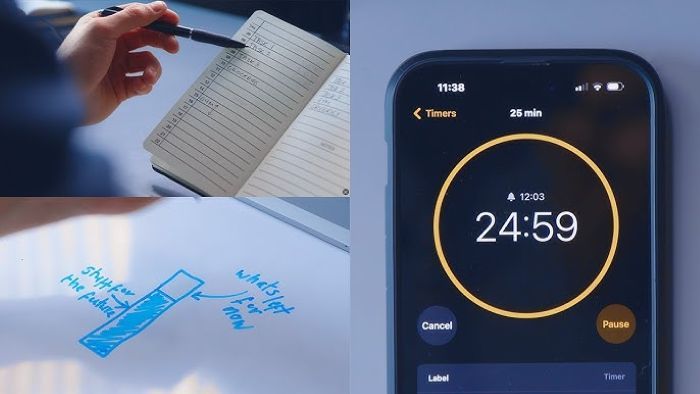

In today's fast-paced world, staying productive without burning out has become a crucial skill for personal and professional success. Let's explore this topic in more detail with Tic Tac Toe below. As we delve into strategies for maintaining productivity while preserving our well-being, we'll discover how to strike the perfect balance between achieving our goals and taking care of ourselves.
Productivity and burnout often seem to be two sides of the same coin. On one hand, we strive to be as productive as possible, constantly pushing ourselves to achieve more. On the other hand, this relentless pursuit of productivity can lead to exhaustion, stress, and ultimately, burnout. The key to sustainable success lies in finding the sweet spot between these two extremes.
Burnout is a state of physical, emotional, and mental exhaustion caused by prolonged exposure to high levels of stress. It can manifest in various ways, including decreased motivation, reduced productivity, and a sense of cynicism or detachment from work. Recognizing the signs of burnout is crucial for maintaining long-term productivity and overall well-being.
To stay productive without burning out, it's essential to understand that productivity isn't about working harder or longer hours. Instead, it's about working smarter and more efficiently while taking care of your physical and mental health. This approach allows you to maintain high levels of productivity over time without sacrificing your well-being.
Read more: Evening Habits That Help You Sleep Better and Wake Up Happier
Implementing effective strategies for sustainable productivity is crucial for avoiding burnout while still achieving your goals. These strategies focus on optimizing your work habits, managing your energy levels, and maintaining a healthy work-life balance.
One of the most important aspects of sustainable productivity is learning to prioritize tasks and focus on what truly matters. Start each day by identifying your most important tasks and tackle them when your energy levels are at their highest. This approach, often referred to as "eating the frog," helps you make significant progress on critical tasks early in the day, reducing stress and increasing overall productivity.
Use tools like the Eisenhower Matrix to categorize tasks based on their urgency and importance. This method helps you focus on high-impact activities while delegating or eliminating less critical tasks. By concentrating your efforts on what truly matters, you can achieve more without overextending yourself.
Effective time management is crucial for maintaining productivity without burning out. The Pomodoro Technique, for example, involves working in focused 25-minute intervals followed by short breaks. This method helps maintain concentration while preventing mental fatigue. Experiment with different time management techniques to find what works best for you.
Another valuable time management strategy is time blocking. This involves scheduling specific time slots for different types of tasks or activities. By dedicating focused time to particular tasks, you can reduce context switching and improve overall efficiency. Remember to include breaks and leisure time in your schedule to maintain a healthy work-life balance.
While time management is important, managing your energy levels is equally crucial for sustainable productivity. Identify your natural energy peaks throughout the day and schedule your most demanding tasks during these periods. This approach allows you to leverage your body's natural rhythms for maximum productivity.
Incorporate regular breaks into your workday to recharge and maintain focus. Use these breaks to engage in activities that replenish your energy, such as taking a short walk, practicing deep breathing exercises, or engaging in brief meditation sessions. By managing your energy effectively, you can maintain high levels of productivity without pushing yourself to the point of exhaustion.
Read more: Time Management for Busy Lives: 7 Simple Tweaks
Your work environment plays a significant role in your productivity and overall well-being. Creating a supportive and conducive workspace can help you stay focused, motivated, and less prone to burnout.
Design your workspace to support productivity and well-being. Ensure proper lighting, comfortable seating, and ergonomic equipment to reduce physical strain. Keep your workspace clean and organized to minimize distractions and promote a sense of calm and focus.
Consider incorporating elements that inspire and motivate you, such as plants, artwork, or personal mementos. These touches can create a more pleasant and energizing work environment, making it easier to maintain productivity without feeling overwhelmed or burned out.
Setting clear boundaries between work and personal life is essential for preventing burnout. Establish specific work hours and stick to them as much as possible. Communicate these boundaries to colleagues, clients, and family members to manage expectations and reduce work-related stress outside of designated hours.
Create a ritual to transition between work and personal time, such as changing clothes, taking a short walk, or engaging in a brief meditation session. These rituals can help you mentally disconnect from work and fully engage in your personal life, promoting better work-life balance and reducing the risk of burnout.
Building a supportive network of colleagues, mentors, and friends can significantly impact your ability to stay productive without burning out. Surround yourself with people who encourage and motivate you, and don't hesitate to seek support when needed.
Regular check-ins with colleagues or mentors can help you stay accountable to your goals while providing opportunities for feedback and guidance. Engaging in collaborative projects or participating in professional development activities can also help maintain motivation and prevent feelings of isolation or stagnation.
Maintaining productivity without burning out requires a holistic approach that includes taking care of your physical and mental health. Prioritizing self-care and personal growth is essential for long-term success and well-being.
Your physical health directly impacts your productivity and resilience to stress. Make sure to get enough sleep, as sleep deprivation can significantly impair cognitive function and increase the risk of burnout. Aim for 7-9 hours of quality sleep each night and establish a consistent sleep schedule.
Regular exercise is another crucial component of maintaining productivity and preventing burnout. Physical activity helps reduce stress, improve mood, and boost energy levels. Find activities you enjoy, whether it's yoga, running, or team sports, and incorporate them into your routine. Even short bursts of exercise, like a brisk 10-minute walk, can have significant benefits.
Nutrition also plays a vital role in sustaining energy levels and cognitive function. Focus on maintaining a balanced diet rich in fruits, vegetables, whole grains, and lean proteins. Stay hydrated throughout the day, as even mild dehydration can negatively impact concentration and mood.
Practicing mindfulness and stress management techniques can help you stay focused, reduce anxiety, and prevent burnout. Incorporate mindfulness exercises into your daily routine, such as meditation, deep breathing, or mindful walking. These practices can help you stay present, manage stress more effectively, and maintain a sense of calm even during challenging times.
Stress management techniques like progressive muscle relaxation, journaling, or engaging in creative hobbies can also help you process emotions and reduce tension. Experiment with different methods to find what works best for you, and make these practices a regular part of your routine.
Investing in your personal and professional development can help maintain motivation and prevent feelings of stagnation that often contribute to burnout. Set aside time for learning new skills, reading industry-related books or articles, or attending workshops and conferences.
Consider setting personal growth goals that align with your values and interests. This could involve learning a new language, developing a creative skill, or volunteering for a cause you're passionate about. Engaging in activities that bring you joy and fulfillment outside of work can provide a sense of balance and perspective, reducing the risk of burnout.
Remember that personal growth is a journey, not a destination. Be patient with yourself and celebrate small victories along the way. This mindset can help you maintain a positive outlook and stay motivated without putting excessive pressure on yourself.
Staying productive without burning out is a delicate balance that requires intentional effort and self-awareness. By implementing strategies for sustainable productivity, creating a supportive work environment, and prioritizing self-care and personal growth, you can achieve your goals while maintaining your well-being.